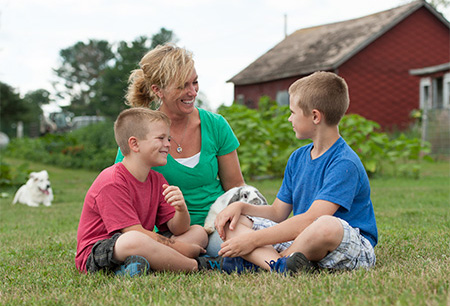If you’ve noticed farm families rarely get sick and don’t seem bothered by the dust that makes other people sneeze and wheeze, your observations are on target.
“We know that children who grow up on farms where animals are raised have a lower likelihood of developing asthma, allergies and eczema,” said Dr. Matthew Keifer, former director of the National Farm Medicine Center (NFMC) at Marshfield Clinic Research Foundation. “That seems to hold true for their whole lives.”
But what makes farm families healthier?
NFMC researchers are working with scientists from the University of Wisconsin School of Medicine and Public Health to answer that question.
Researchers in Switzerland think the benefit is linked to a protein found in the lungs – at least for mice exposed to farm dust early in life. Scientists believe the same is true for humans but aren’t certain.
It’s also unknown what is present on farms that causes the benefit.
“Our strongest hypothesis is that it’s related to the bacteria, fungi or viruses on farms with animals,” Keifer said.
Farm immunity research at Marshfield Clinic
To pinpoint what keeps farm families healthy, NFMC researchers are studying 200 Marshfield area families with babies. Half the families live on farms and half of them don’t.
Researchers will take environmental samples and specimen samples, including nasal swabs, stool samples and breast milk samples; track exposure to farm animals and development of sickness; and measure growth of cells linked to immunity for all participants.
Scientists think kids exposed to farm microbes before they’re born or early in life have an immune advantage.
“An allergy is the body defending itself against something that’s not attacking it,” Keifer said. “It appears that exposure early in life teaches to the body to be less excited about things that aren’t hurting it.”
Treatment on the horizon
He hopes researchers will be able to use the study’s findings to develop a therapy to prevent asthma and allergies in people who don’t live on farms.
Being able to deliver the therapy like a vaccine would improve quality of life for many people, Keifer said.
The research study is still enrolling participants from farm and non-farm families. For more information, call the study hotline at 1-888-512-5488.







Leave a Reply